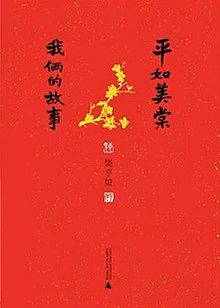
Chiang Ching-kuo was a politician of the Republic of China. The eldest and only biological son of Generalissimo Chiang Kai-shek, he held numerous posts in the government of the Republic of China and ended martial law in 1987. He served as the 3rd premier of the Republic of China between 1972 and 1978 and was president of the Republic of China from 1978 until his death in 1988.

Wang Zhaoming, widely known by his pen name Wang Jingwei, was a Chinese politician who was president of the Reorganized National Government of the Republic of China, a puppet state of the Empire of Japan. He was initially a member of the left wing of the Kuomintang (KMT), leading a government in Wuhan in opposition to the right-wing Nationalist government in Nanjing, but later became increasingly anti-communist after his efforts to collaborate with the Chinese Communist Party ended in political failure.
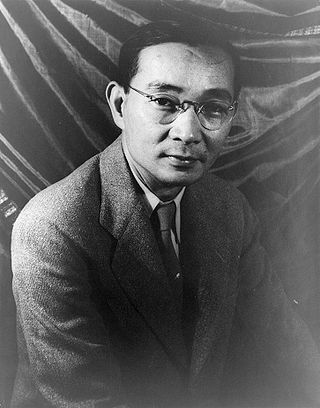
Lin Yutang was a Chinese inventor, linguist, novelist, philosopher, and translator. One scholar commented that Lin's "particular blend of sophistication and casualness found a wide audience, and he became a major humorous and critical presence", and he made compilations and translations of the Chinese classics into English. His My Country and My People (1935) reached the top of the New York Times bestseller list. Some of his writings criticized the racism and imperialism of the West.
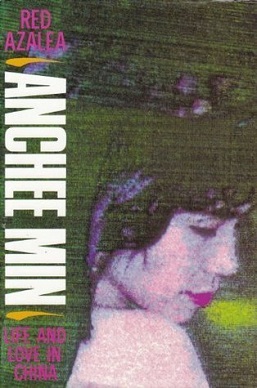
Red Azalea is a memoir of Chinese American writer Anchee Min. It was written during the first eight years she spent in the United States, from 1984 to 1992, and tells the story of her personal experience during the Cultural Revolution.

Dai Li, courtesy name Yunong, was a Chinese lieutenant general and spymaster. Dai was born in Jiangshan, Zhejiang and later studied at the Whampoa Military Academy, where Chiang Kai-shek served as Chief Commandant, and later became head of the Bureau of Investigation and Statistics (BIS) within the Nationalist government of the Republic of China (ROC).
Porter Shreve is an American author and professor of English and Creative Writing. He is the son of writer Susan Shreve.

Michelle Tea is an American author, poet, and literary arts organizer whose autobiographical works explore queer culture, feminism, race, class, sex work, and other topics. She is originally from Chelsea, Massachusetts and was active in the San Francisco literary and arts community for many years. She currently lives in Los Angeles. Her books, mostly memoirs, are known for their exposition of the queercore community.

Lust, Caution is a 2007 erotic spy romantic mystery film directed by Ang Lee, based on the 1979 novella by Eileen Chang. Lust, Caution is set in Hong Kong in 1938 and in Shanghai in 1942, when the city was occupied by the Imperial Japanese Army and ruled by the puppet government led by Wang Jingwei. The film depicts a group of Chinese university students from the University of Hong Kong who plot to eliminate a high-ranking special agent and recruiter working for the puppet government by luring him into a honey trap. The film is generally accepted to be based on the historical event of Chinese spy Zheng Pingru's failed attempt to assassinate the Japanese collaborator Ding Mocun.

The Shanghai massacre of 12 April 1927, the April 12 Purge or the April 12 Incident as it is commonly known in China, was the violent suppression of Chinese Communist Party (CCP) organizations and leftist elements in Shanghai by forces supporting General Chiang Kai-shek and conservative factions in the Kuomintang. Following the incident, conservative KMT elements carried out a full-scale purge of communists in all areas under their control, and violent suppression occurred in Guangzhou and Changsha. The purge led to an open split between left-wing and right-wing factions in the KMT, with Chiang Kai-shek establishing himself as the leader of the right-wing faction based in Nanjing, in opposition to the original left-wing KMT government based in Wuhan, which was led by Wang Jingwei. By 15 July 1927, the Wuhan regime had expelled the Communists in its ranks, effectively ending the First United Front, a working alliance of both the KMT and CCP under the tutelage of Comintern agents. For the rest of 1927, the CCP would fight to regain power, beginning the Autumn Harvest Uprising. With the failure and the crushing of the Guangzhou Uprising at Guangzhou however, the power of the Communists was largely diminished, unable to launch another major urban offensive.

Chen Jieru, also romanized Ch'en Chieh-ju, was the second wife of Chiang Kai-shek. She was nicknamed Jennie.
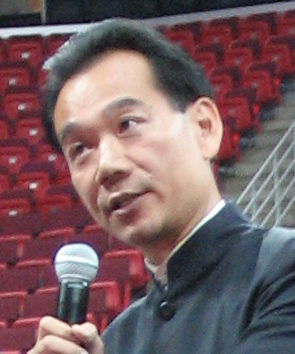
Da Chen was a Chinese-American author whose works included Colors of the Mountain, Brothers, and Sword. Colors of the Mountain gave rise to a version for young readers, China's Son, and a sequel, Sounds of the River. The Washington Post, San Francisco Chronicle, Miami Herald and Publishers Weekly hailed Brothers as the best book of 2006.
Howard Dully is an American memoirist who is one of the youngest survivors of the transorbital lobotomy, a procedure performed on him when he was 12 years old.

John Sacret Young was an American author, producer, director, and screenwriter primarily in television, perhaps best known for his work on the show China Beach. Young was nominated for seven Emmys and seven Writers Guild of America Awards, winning two WGA Awards.
Peng Chong, born Xu Tieru (許鐵如), was a member of the Chinese Communist Party (CCP) Central Committee (1969–87) and its politburo (1977–82); and Secretary General of the National People’s Congress between 1988 and 1992.
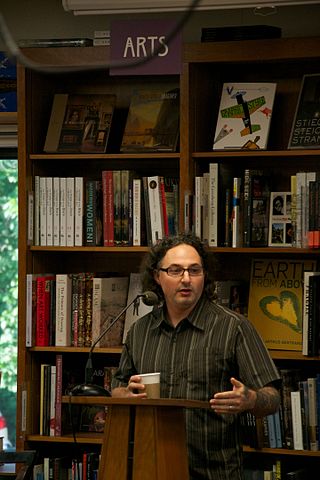
Paul Madonna is an American artist and author.

Leslie Sierra Jamison is an American novelist and essayist. She is the author of the 2010 novel The Gin Closet and the 2014 essay collection The Empathy Exams. Jamison also directs the nonfiction concentration in writing at Columbia University School of the Arts.

Hu Lanqi, also spelled Hu Lanxi, was a Chinese writer and military leader. She joined the National Revolutionary Army in 1927 and the Chinese branch of the Communist Party of Germany in 1930. She was imprisoned by Nazi Germany in 1933 and wrote an influential memoir of her experience, for which she was invited by Maxim Gorky to meet him in Moscow. After the outbreak of the Second Sino-Japanese War in 1937, she organized a team of women soldiers to resist the Japanese invasion, and became the first woman to be awarded the rank of Major General by the Republic of China. She supported the Communists during the Chinese Civil War, but was persecuted in Mao Zedong's political campaigns following the Communist victory in mainland China. She survived the Cultural Revolution to see her political rehabilitation, and published a detailed memoir of her life in the 1980s.

Zheng Pingru was a Chinese socialite and spy who gathered intelligence on the Imperial Japanese Army during the Second Sino-Japanese War. She was executed after an unsuccessful attempt to assassinate Ding Mocun, the security chief of the Wang Jingwei regime, a puppet government for the Japanese. Her life is believed to be the inspiration for Eileen Chang's novella Lust, Caution, which was later adapted into the eponymous 2007 film by Ang Lee.
Rao Pingru was a Chinese comic book author who wrote the autobiographical love memoir Our Story.
